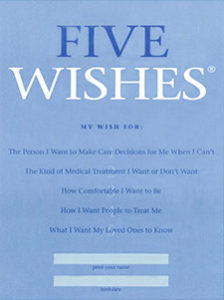To Plan or Not to Plan? That is the Question
I’m amazed how we Americans often take a significant amount of time in planning a dinner, a party, or an event, and yet we often take no time to talk about one of the most significant and profound times in our lives – our own end of life. No, this is not about planning your death via assisted suicide, but even more basic and fundamental issues such as:
- Who do I want to step up and make decisions for me when I can no longer do that for myself?
- How do I want that trusted person to make decision for me regarding my comfort, pain control, life support vs. a natural death?
- Who do I want to be with me?
- Where do I want to spend my last hours/days/weeks?
- And, last but not least, how do I want to be remembered or what do I want to say to those who have given my life meaning?
 My work is to help people at their most crisis-filled and chaotic time in the hospital, under conditions of extreme illness. These people, who are family members of the very ill loved one who is unable to make decisions, are trying to decide what we need to do for the loved one – and there are some difficult decisions that must be made. For any family members these decisions are hard, but it is much easier if the loved one has made their wishes known before the illness, wishes about how they want their care to be, wishes around CPR, pain control, and overall quality of life. This idea of planning ahead for end of life is called “advance care planning,” and the documents that can be completed are called “advance directives.”
My work is to help people at their most crisis-filled and chaotic time in the hospital, under conditions of extreme illness. These people, who are family members of the very ill loved one who is unable to make decisions, are trying to decide what we need to do for the loved one – and there are some difficult decisions that must be made. For any family members these decisions are hard, but it is much easier if the loved one has made their wishes known before the illness, wishes about how they want their care to be, wishes around CPR, pain control, and overall quality of life. This idea of planning ahead for end of life is called “advance care planning,” and the documents that can be completed are called “advance directives.”
Dealing with families who have the comfort and assurance that they are doing “what my mom told me to do, and I’m going to carry those wishes out” is much easier than the family who says “my mom/dad/husband would never talk to me about it, so I don’t really know what I should do now about a feeding tube/ CPR/dialysis/pain medicine.” The burden of decision-making is much lighter for those loved ones who have taken the time to talk about and put these wishes into writing than for the family who “never talked about it, or said we would get to it someday, and someday never came.”
April 16 is National Health Care Decisions Day, so take time on that day or before to sit down and talk to your family about what your wishes are for your end of life. Complete the documents to name someone you trust to be your Health Care Power of Attorney, put your plan into writing, sign it with a notary, then give copies to family and medical providers, and always take these documents to the hospital if you have to go. To plan or not to plan? Unquestionably the answer is “PLAN”!
–Jane Owen FNP-BC
Jane is a nurse practitioner for inpatient palliative medicine at Transitions LifeCare.